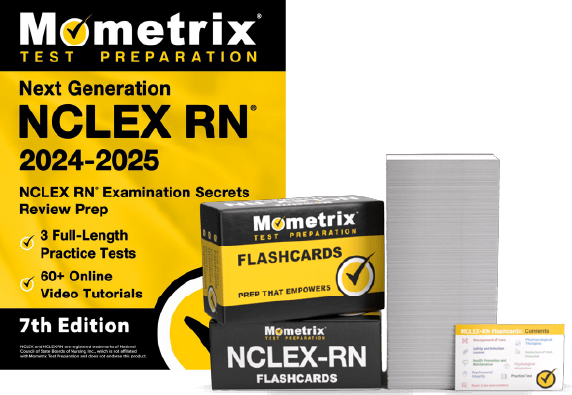If you need help studying for the NCLEX-RN® exam or just want some more information about what the test is like, you’ve come to the right place.
Click below to take a free NCLEX-RN practice test!
What’s on the Exam?
First, let’s talk about the questions on the exam. There are 150 multiple-choice questions total, but only 135 of the questions will count toward your score. Why is that?
The 15 unscored questions on the exam are called “pretest” questions. These are added to the exam to determine if they’re good enough questions to add to future versions of the test.
The trick is that you won’t have any way of knowing which questions are scored and which ones are pretest. They will appear just like the scored questions throughout the test.
If you answer fewer than that, you will not be eligible to pass, even if your answers were correct.
Let’s take a closer look at the different sections of the NCLEX-RN exam.
1. Management of Care
15%-21% of the exam
- Integrating advance directives into the client’s plan of care
- Delegating and supervising care provided by others
- Organizing workload to manage time effectively
- Practicing and advocating for cost-effective care
- Initiating, evaluating, and updating the client’s plan of care
- Providing education to clients and staff about client rights and responsibilities
- Collaborating with multidisciplinary team members when providing client care
- Maintaining client confidentiality and privacy
- Providing and receiving handoff of care on assigned clients
- Prioritizing the delivery of client care based on acuity
- Recognizing and reporting ethical dilemmas
- Practicing in a manner consistent with the nurses’ code of ethics
- Providing care within the legal scope of practice
2. Safety and Infection Control
10%-16% of the exam
- Assessing clients for allergies and intervening as needed
- Protecting clients from injury
- Properly identifying clients when providing care
- Verifying appropriateness and accuracy of treatment orders
- Participating in emergency planning and response
- Following procedures for handling biohazardous and hazardous materials
- Educating clients on safety issues
- Acknowledging and documenting practice errors and near misses
- Reporting, intervening, or escalating unsafe practices by health care personnel
- Facilitating appropriate and safe use of equipment
- Applying principles of infection prevention (e.g., hand hygiene, aseptic technique)
- Educating clients and staff about infection prevention measures
- Following requirements when using restraints
3. Health Promotion and Maintenance
6%-12% of the exam
- Providing care and education for clients from birth through 2 years old
- Providing care and education for clients ages 3 through 17 years
- Providing care and education for adult clients ages 18 through 64 years
- Providing care and education for adult clients ages 65 and older
- Providing prenatal care and education
- Providing post-partum care and education
- Assessing and educating clients about health risks based on family, population, and community
- Assessing client readiness to learn, learning preferences, and learning barriers
- Planning and participating in community health education
- Educating clients about preventative care and health maintenance
- Providing resources to minimize communication barriers
- Performing targeted screening assessments
- Performing comprehensive health assessments
4. Psychosocial Integrity
6%-12% of the exam
- Assessing clients for abuse or neglect and reporting, intervening, or escalating as needed
- Incorporating behavioral management techniques when caring for clients
- Assessing clients for substance abuse or toxicities and intervening appropriately
- Assessing clients’ ability to cope with life changes and providing support
- Assessing the potential for violence and using safety precautions
- Incorporating client cultural practices and beliefs when planning care
- Providing end-of-life care and education to clients
- Assessing client support systems to aid in planning care
- Providing care for clients experiencing grief or loss
- Providing care and education for acute and chronic psychosocial health issues
- Assessing psychosocial factors and planning appropriate interventions
- Recognizing non-verbal cues related to physical or psychological stressors
- Using therapeutic communication techniques
5. Basic Care and Comfort
6%-12% of the exam
- Assisting clients in compensating for physical or sensory impairments
- Assessing and managing clients with bowel and bladder elimination issues
- Performing skin assessments and implementing measures to maintain skin integrity
- Applying, maintaining, or removing orthopedic devices
- Implementing measures to promote circulation
- Assessing clients for pain and intervening appropriately
- Providing non-pharmacological comfort measures
- Evaluating client nutritional status and intervening as needed
- Providing client nutrition through tube feedings
- Evaluating client intake and output and intervening as needed
- Assessing performance of activities of daily living and assisting when needed
- Assessing client sleep and rest patterns and intervening as needed
- Performing post-mortem care
6. Pharmacological and Parenteral Therapies
13%-19% of the exam
- Administering blood products and evaluating client response
- Accessing and maintaining central venous access devices
- Performing calculations needed for medication administration
- Evaluating client response to medications
- Educating clients about medications
- Preparing and administering medications using the rights of medication administration
- Reviewing pertinent data prior to medication administration
- Participating in the medication reconciliation process
- Titrating medication dosage based on assessment and orders
- Disposing of medications safely
- Handling and administering high-risk medications safely
- Monitoring intravenous infusions and maintaining sites
- Handling and administering controlled substances within regulatory guidelines
7. Reduction of Risk Potential
9%-15% of the exam
- Assessing and responding to changes and trends in client vital signs
- Performing testing within scope of practice
- Monitoring results of diagnostic testing and intervening as needed
- Inserting, maintaining, or removing a urinary catheter
- Inserting, maintaining, or removing a peripheral intravenous line
- Applying and maintaining devices to promote venous return
- Using precautions to prevent injury or complications associated with procedures
- Evaluating client responses to procedures and treatments
- Recognizing trends and changes in client condition and intervening as needed
- Performing focused assessments
- Educating clients about treatments and procedures
- Providing preoperative and postoperative education
- Managing clients during and after moderate sedation
8. Physiological Adaptation
11%-17% of the exam
- Monitoring and caring for clients on a ventilator
- Managing the care of clients receiving hemodialysis or continuous renal replacement therapy
- Managing the care of clients with fluid and electrolyte imbalances
- Managing the care of clients with impaired ventilation or oxygenation
- Providing postoperative care
- Providing pulmonary hygiene
- Performing wound care and dressing changes
- Performing suctioning
- Providing ostomy care and education
- Monitoring and maintaining arterial lines
- Assisting with invasive procedures
- Recognizing signs and symptoms of complications and intervening
- Performing emergency care procedures
Computer-Adaptive Testing (CAT)
The NCLEX-RN is a computer-adaptive test. Basically, this means that the questions will become harder or easier as you go through the exam, based on how well you’re answering the questions.
For example, say you answered the first question correctly. The first question is of medium difficulty, so the next question will be slightly harder. Then, let’s say you answered the second question incorrectly. The next question would then be a medium question.
How to Register
Once you’ve ensured that you meet all of the eligibility requirements, you can register for the exam.
There are two parts to this process.
- First, you need to contact your NRB and request a registration application.
- Then, you need to register with Pearson VUE.
NCLEX-RN Scores
The NCLEX-RN uses a unique scoring method. Instead of counting how many questions you got right, your score is measured in something called “logits.”
A logit is a unit that measures your ability based on the difficulty of the exam questions. The higher your logit score, the more likely it is that you’ve met the passing standard.
The test keeps checking your score as you answer questions. If the system is 95% sure you’ve passed or failed after the minimum 85 questions, it stops the test right there.
If it’s not sure yet, you’ll keep going until the computer is confident or until you hit the max of 150 questions. Once you reach 150, the system makes a final decision based on your performance.
Basically, the better you do, the fewer questions you have to answer. But even if you go all the way to 150 questions, you can still pass.
Retaking the Exam
If you didn’t get a passing score on your first try, that’s okay! You can retake the test after a 45-day waiting period.
Keep in mind that you will have to pay the full testing fee every time you retake the test.
Online NCLEX-RN Prep Course
If you want to be fully prepared, Mometrix offers an online NCLEX-RN prep course. The course is designed to provide you with any and every resource you might want while studying. The NCLEX-RN course includes:
The NCLEX-RN prep course is designed to help any learner get everything they need to prepare for their NCLEX-RN exam. Click below to check it out!
FAQs
How many questions are on the NCLEX-RN exam?
The test contains anywhere from 85 to 150 questions.
What is the time limit for the NCLEX-RN exam?
The exam is timed at 5 hours.
What is the passing score for the NCLEX-RN exam?
The passing score is 0.00 logits.
How much does the NCLEX-RN exam cost?
The registration fee is $200.
NCLEX and NCLEX-PN are registered trademarks of National Council of State Boards of Nursing, Inc., which is not affiliated with Mometrix Test Preparation and does not endorse this page.



 NCLEX-RN
NCLEX-RN NCLEX-RN
NCLEX-RN NCLEX-RN
NCLEX-RN


